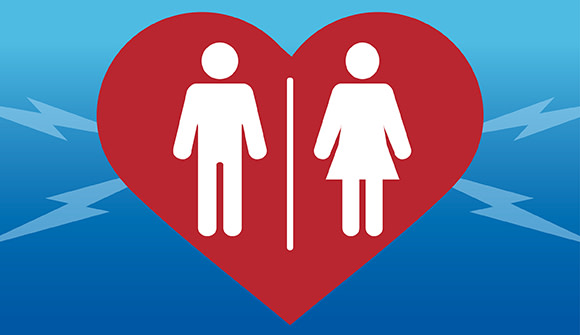Let's talk about sex
Looking to reconnect between the sheets? Two gynecologists share how.
Article Date:

It’s a well-kept secret: Many people don’t have the sex life they want.
And, how could you know? Men don’t talk about it with their buddies over a beer. Women don’t chat about it with their girlfriends during an after-yoga meet-up. Where the conversations show up in force is when women visit their gynecologist.
“We hear it all the time. It’s what people ask us about the most,” said Mary Ellen Wechter, MD, a gynecologist with North Florida Gynecology Specialists, which serves patients at Baptist Health. “They’re already talking about the intimate details of their lives. When we ask how they’re doing sexually, all of a sudden we become a source of information for a subject they have years of questions about.”
Young women are the most forward. Menopausal women are typically a bit shy.
“I’ll ask older women if they are sexually active, and they say ‘Oh, I don’t have any desire.’ But once you ask, they are very interested,” said Paulami Guha, MD, also a gynecologist at North Florida Gynecology Specialists.
These problems have solutions. It simply begins with talking about it. Here are the most common suggestions Drs. Wechter and Guha give to women who want to improve their sex lives.
Check your medications
Certain hormonal birth control methods are known to cause vaginal dryness in some women, Dr. Guha said. Great sex and vaginal dryness don’t mix. Ask your gynecologist for an alternative. Also, some anti-depressants come with sexual side effects. Ask your doctor if yours is one of them.
Address the pregnancy/STD issue
When women are worried about getting pregnant or catching a sexually transmitted disease (STD), they avoid sex. It’s a problem that surfaces even with older women who are in a new relationship. Talk with your partner.
Birth control and STD prevention are the solutions, but that doesn’t always mean the same thing. STDs are prevented by using condoms, in most cases, since many STD’s are transmitted by exchanging sexual fluids. If herpes is an issue, partners should avoid sex during a flare-up since herpes can also be transmitted by skin-to-skin contact.
When a woman is the one who has the STD, she may avoid sex entirely because she’s embarrassed. Herpes is one STD that still carries a huge stigma.
“Women think their whole sex life is over because they have herpes. They think they’re alone,” Dr. Wechter said. “But herpes is so common, many times both partners carry the virus.”
Then, it becomes a non-issue. When only one partner has herpes, they can take antiviral medications to keep the other partner from catching it.
Treat painful intercourse
Nothing kills the mood like painful sex. Pain is common among menopausal women because lower estrogen leads to less vaginal lubrication and stretchiness.
“They may have the desire, but because it’s painful, they’re not having sex. So slowly, the desire also dies out,” Dr. Guha said.
Topical estrogens—creams placed directly in the vagina—work fast, and often with dramatic effects. Since they’re targeted hormone therapy, they carry a much lower risk of breast cancer than hormones taken as pills you swallow.
Pay attention to the kind of pain you’re having. A deep pain that feels like your partner is bumping into something could signal a mass in the uterus or elsewhere. Fibroids, endometriosis and tumors are possible. Check with your gynecologist.
Low libido? There’s a root cause.
Libido is a worry that cuts across all generations. Libido—also known as sex drive—is often less than a woman wants it to be. Even more often, it’s less than a woman’s partner wants it to be.
“Sometimes I walk out of the clinic and I think ‘Gosh 90% of the women today said they have a problem with libido.’ It’s really common,” Dr. Wechter said.
Low libido isn’t a natural state. There’s usually a root cause. Physical problems, emotional worries and stress are the most likely culprits.
Men’s libidos benefit from high testosterone. For women, libido depends on a sense of well-being, self-care and emotional intimacy. A woman needs to have rest and feel good in her own skin in order to see physical intimacy as an attractive option.
Sometimes, not wanting sex is an early sign you’re in an unhappy relationship. It’s something Dr. Guha talks about a lot with younger patients. In a good relationship, both partners share the work and have a sense of mutual respect and love.
“Feelings are the most important thing,” Dr. Guha said. “If that’s not working, the sex is not going to work either.”
A quality sex life is important to a healthy relationship. If you have questions about yours, visit 4her or call 904.202.4her (4437).



